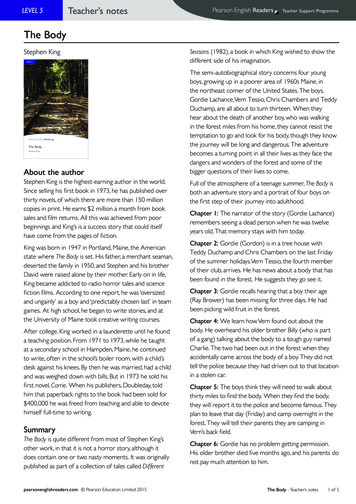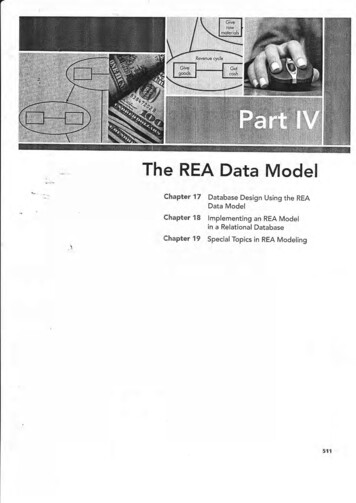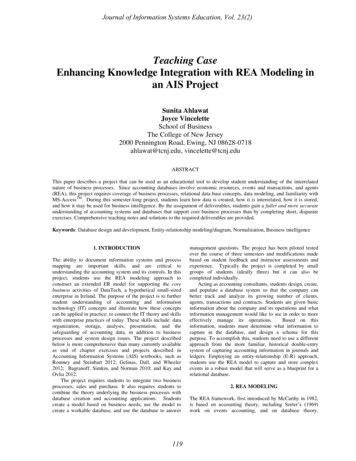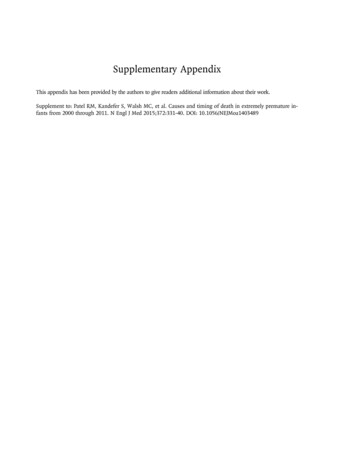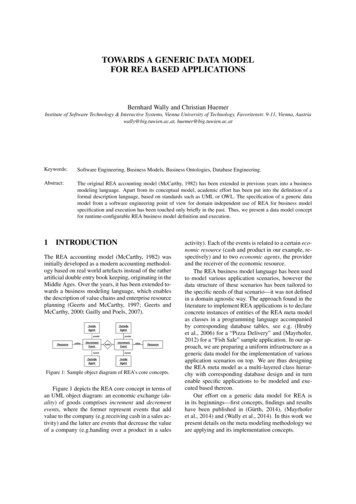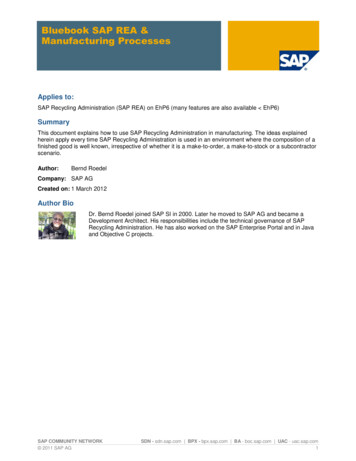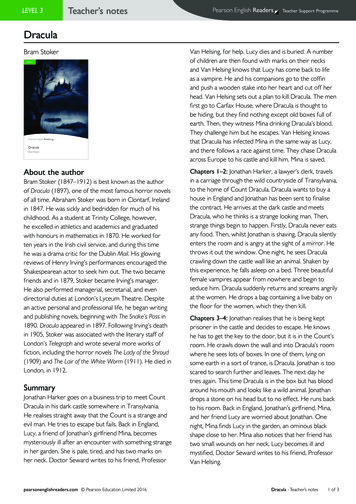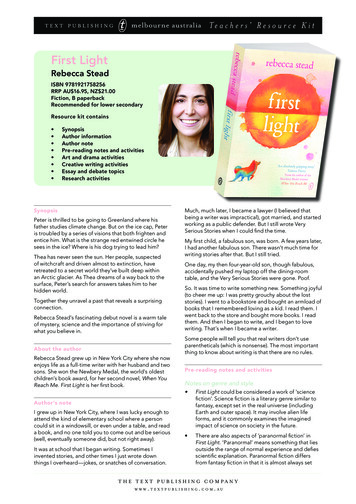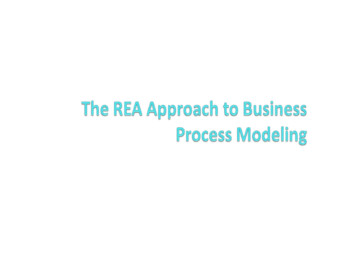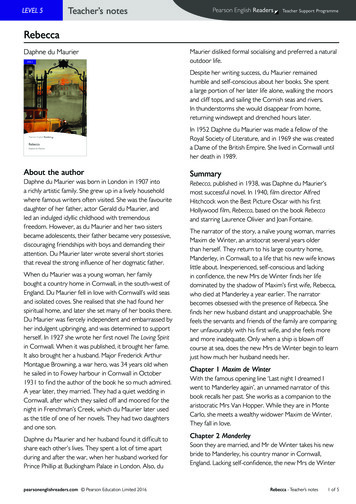
Transcription
level 5Teacher’s notesTeacher Support ProgrammeRebeccaDaphne du MaurierMaurier disliked formal socialising and preferred a naturaloutdoor life.Despite her writing success, du Maurier remainedhumble and self-conscious about her books. She spenta large portion of her later life alone, walking the moorsand cliff tops, and sailing the Cornish seas and rivers.In thunderstorms she would disappear from home,returning windswept and drenched hours later.In 1952 Daphne du Maurier was made a fellow of theRoyal Society of Literature, and in 1969 she was createda Dame of the British Empire. She lived in Cornwall untilher death in 1989.About the authorDaphne du Maurier was born in London in 1907 intoa richly artistic family. She grew up in a lively householdwhere famous writers often visited. She was the favouritedaughter of her father, actor Gerald du Maurier, andled an indulged idyllic childhood with tremendousfreedom. However, as du Maurier and her two sistersbecame adolescents, their father became very possessive,discouraging friendships with boys and demanding theirattention. Du Maurier later wrote several short storiesthat reveal the strong influence of her dogmatic father.When du Maurier was a young woman, her familybought a country home in Cornwall, in the south-west ofEngland. Du Maurier fell in love with Cornwall’s wild seasand isolated coves. She realised that she had found herspiritual home, and later she set many of her books there.Du Maurier was fiercely independent and embarrassed byher indulgent upbringing, and was determined to supportherself. In 1927 she wrote her first novel The Loving Spiritin Cornwall. When it was published, it brought her fame.It also brought her a husband. Major Frederick ArthurMontague Browning, a war hero, was 34 years old whenhe sailed in to Fowey harbour in Cornwall in October1931 to find the author of the book he so much admired.A year later, they married. They had a quiet wedding inCornwall, after which they sailed off and moored for thenight in Frenchman’s Creek, which du Maurier later usedas the title of one of her novels. They had two daughtersand one son.Daphne du Maurier and her husband found it difficult toshare each other’s lives. They spent a lot of time apartduring and after the war, when her husband worked forPrince Phillip at Buckingham Palace in London. Also, dupearsonenglishreaders.com Pearson Education Limited 2016SummaryRebecca, published in 1938, was Daphne du Maurier’smost successful novel. In 1940, film director AlfredHitchcock won the Best Picture Oscar with his firstHollywood film, Rebecca, based on the book Rebeccaand starring Laurence Olivier and Joan Fontaine.The narrator of the story, a naïve young woman, marriesMaxim de Winter, an aristocrat several years olderthan herself. They return to his large country home,Manderley, in Cornwall, to a life that his new wife knowslittle about. Inexperienced, self-conscious and lackingin confidence, the new Mrs de Winter finds her lifedominated by the shadow of Maxim’s first wife, Rebecca,who died at Manderley a year earlier. The narratorbecomes obsessed with the presence of Rebecca. Shefinds her new husband distant and unapproachable. Shefeels the servants and friends of the family are comparingher unfavourably with his first wife, and she feels moreand more inadequate. Only when a ship is blown offcourse at sea, does the new Mrs de Winter begin to learnjust how much her husband needs her.Chapter 1 Maxim de WinterWith the famous opening line ‘Last night I dreamed Iwent to Manderley again’, an unnamed narrator of thisbook recalls her past. She works as a companion to thearistocratic Mrs Van Hopper. While they are in MonteCarlo, she meets a wealthy widower Maxim de Winter.They fall in love.Chapter 2 ManderleySoon they are married, and Mr de Winter takes his newbride to Manderley, his country manor in Cornwall,England. Lacking self-confidence, the new Mrs de WinterRebecca - Teacher’s notes 1 of 5
level 5Teacher’s notesTeacher Support ProgrammeRebeccafeels that the servants are not welcoming her, particularlyMrs Danvers the housekeeper.Chapter 3 The Cottage in the BayMaxim’s sister Beatrice tells the new Mrs de Winterthat Mrs Danvers was profoundly devoted to Rebecca,Maxim’s first wife. Later, Maxim and his wife go for a walk,and she finds a cottage in the bay; this causes the coupleto have a little argument.Chapter 9 Favell Accuses MaximA verdict of suicide is brought at the inquiry. ThenJack Favell claims that Rebecca wasn’t suicidal, andMaxim comes under suspicion of murder. It is revealedthat Rebecca had a secret visit to a London doctor.Chapter 10 The Visit to Dr BakerMrs de Winter finds out that the cottage was used byRebecca who drowned off the coast. Despite her death,her aura seems to pervade Manderley.Dr Baker, the doctor who Rebecca saw shortly beforeher death, reveals that Rebecca wasn’t pregnant, butsuffering from a serious illness and would have died withina few months. Maxim thinks Rebecca wanted him to killher. On returning to Manderley, Maxim and his wife findit on fire.Chapter 5 Rebecca’s RoomBackground and themesRebecca’s cousin Jack Favell appears at Manderley whenMaxim is away. He seems to know Mrs Danvers very well.Mrs de Winter accidentally goes into Rebecca’s roomwhere everything was preserved as it used to be.In 1937–8, when Daphne du Maurier wrote Rebecca,Europe was on the brink of war. Many contemporarywriters were concerned with subjects such as poverty,psychology, war, fascism and religion. Authors like JamesJoyce, were exploring the ‘stream of consciousness’technique to illustrate the human condition.Chapter 4 The Shadow of RebeccaChapter 6 The Fancy-Dress DanceThere is a fancy dress party at Manderley, andMrs de Winter has no idea what to wear. Mrs Danversis unusually kind to her and suggests that she wear acostume replica of one of the former inhabitants ofManderley. The same costume, in fact, had been wornby Rebecca at the previous fancy dress party. Maximgets very angry.Chapter 7 The Sunken BoatOverwhelmed and intimidated, Mrs de Winter begins todoubt her relationship with her husband; she thinks thatMaxim is still in love with the perfect Rebecca. Things,however, change dramatically when the sunken boat isdiscovered. Rebecca’s body is found in the boat at thebottom of the sea, and this leads Maxim to confess thetruth to his new wife. He and Rebecca hated each other.Rebecca had series of love affairs, and then she claimedto be pregnant by another man and threatened to burdenMaxim with the responsibility of raising the child. Maximkilled her and took the body out in the boat, which hesank at sea. Instead of being scared of the murderer,Mrs de Winter is relieved to hear that Maxim didn’t anddoesn’t love Rebecca.Chapter 8 The InquiryThere is an inquest, and the boat builder makes astatement about three holes hammered through thebottom of the boat. When Maxim is asked if he andRebecca had a happy relationship, Mrs de Wintergets faint.pearsonenglishreaders.com Pearson Education Limited 2016Daphne du Maurier ignored the modern trends andwrote straightforward stories that gripped the imaginationof her readers. She recognised early on in her career, thatit was mainly women who read her books. She fed heraudience’s desire for adventure, romance, sexuality andmystery with stories that transported them into the worldof their fantasies.First wife versus second wife: Only after the secondMrs de Winter arrives at Manderley, does she realise howdifficult it will be to live there, continuously competingwith the memory of the first Mrs de Winter, Rebecca.Inadequacy: Daphne de Maurier hated social events,feeling self-conscious, shy, out of her depth andinadequate. These are the feelings she gives the characterof the second Mrs de Winter, who is lost and awkwardin her new life as mistress of Manderley. The secondMrs de Winter has never known the life of aristocracyand struggles with the social demands. Du Maurieremphasises her sense of inadequacy by not even givingher a name.The balance of power in marriage: The story shows arelationship between a powerful man and his intimidatedwife. When the husband tells the truth of his past, theyoung, naïve wife suddenly grows up. The balance ofpower in their marriage changes at that moment.Rebecca - Teacher’s notes 2 of 5
level 5Teacher’s notesTeacher Support ProgrammeRebeccaJealousy: This story is a study of how jealousy motivatespeople. Manderley’s housekeeper, Mrs Danvers admiredRebecca so much that she cannot accept the second Mrsde Winter. Her domineering acts showing scorn towardsthe second Mrs de Winter has made Mrs Danvers one ofliterature’s most infamous female villains.5Guilt and innocence: The story makes you wonder whowas really guilty and who was really innocent in the end.Perhaps many readers feel that Maxim is innocent eventhough he was guilty and that Rebecca was guilty eventhough she was ‘innocent’.Chapter 3, pages 11–18After reading6Transition: The story describes the second Mrs deWinter’s transition from a self-conscious, inexperiencednew bride to a mature woman.Discussion activitiesChapter 1, pages 1–7Before reading1Discuss: Talk about the story.Ask students if there is anyone who knows this story(by reading the book or seeing the film). Ask thosestudents to tell the rest of the class a little bit aboutthe story, e.g. who the protagonist is, when the storyis set, who the other characters are, etc. If no oneknows, give them the information as above. Thenlead a whole class discussion on what the story isabout and how they think it ends. Ask students towrite down what they know and presume about thestory. They should keep this record in order to comeback to it when they finish reading.7Discuss: Stop reading at page 3, line 28. Havestudents work in small groups. Have them discuss thefollowing questions. Where is the narrator now? What has happened to Manderley?After reading3Describe: Put students into small groups. Have themwork out what they know about the characters nowand try to describe them. Have each group sharetheir descriptions with the rest of the class. You couldappoint one character per group or you could askthem to describe all of the characters: the narrator,Mrs Van Hopper and Mr de Winter.Chapter 2, pages 7–11After reading4Discuss: Have students work in pairs or small groups.Have them discuss Mrs Danvers’ feelings towards thenew bride.pearsonenglishreaders.com Pearson Education Limited 2016Describe: Divide the class into small groups. Giveeach group an anagram of a name of one of thecharacters: Maxim, narrator, Beatrice, Frank, MrsDanvers and Rebecca. Students unscramble theirname and then think up as many adjectives as theycan to describe that person. Each group tells the restof the class their adjectives, and the class tries towork out who the character is.Discuss: Put students into pairs. Have them discussthe following question. Why do you think Daphne du Maurier does not givethe narrator a name? Do you like the narrator? If you were in the narrator’s place, would you actdifferently? If so, how?Chapter 4, pages 19–23After reading8While reading2 How do you think Mrs Danvers feels towards thenew Mrs de Winter? Why do you think she feels like this?Write: Have students write a diary as the protagonist.You are the new Mrs de Winter. You’ve been married fora few weeks now. This is your first night at Manderley.Write in your diary and describe what has happenedduring the day, how you feel about it and what you thinkyou are going to do the next day.Role play: Put students into pairs for a role play.One student is Frank, the other is the narrator.Discuss with the whole class what they need to knowand what they should pay attention to, such as bodylanguage, facial expressions and voice quality. Havethem act out the conversation when the narratorasks questions about Rebecca. Monitor the pairswhile they’re practising, and later ask some of themto perform in front of the class.Chapter 5, pages 23–31After readingDiscuss: Have students work in pairs or small groups.Ask, Why do you think Jack Favell visited Mrs Danverswhile Maxim was away? Have them discuss thereasons from the narrator’s point of view.10 Discuss: Put students into pairs. Have them discussthe following question. Why does Mrs Danvers keep Rebecca’s room asthough it were in use? How would you feel if you were the second Mrs deWinter and saw Rebecca’s room? How would youreact to the fact that Rebecca’s room was kept as itused to be?9Rebecca - Teacher’s notes 3 of 5
level 5Teacher’s notesTeacher Support ProgrammeRebeccaChapter 6, pages 31–36After reading11 Discuss: Talk about the marriage of Maxim and thesecond Mrs de Winter.Put students into small groups. Have them discusshow and why they think the marriage of Maxim andhis second wife has changed since they came toManderley.12 Group work: Divide the class into small groups. Giveeach group one of the following characters’ names:Mr de Winter, Mrs de Winter, Beatrice, Frank,Rebecca, Jack, Mrs Danvers and Clarice. Groupsdiscuss and write a history for their character,describing the childhood, adolescence, family, jobs, etcthat person may have had. Each group reports theirthoughts to the whole class.13 Discuss: Put students into small groups. Ask themto imagine that they are going to a fancy dress party.You could give each group a theme for the party ifit’s easier for your students to come up with thecostumes. Have them discuss what to wear. Theycould draw a picture or describe it in writing. Later,ask some students to share their ideas aboutcostumes with the rest of the class.Chapter 7, pages 36–59Before reading14 Guess: Give students a list of words from Chapter 7,e.g. explosion, rock, sunken boat, diver, body, love,kill, etc. Then, put students into small groups, andhave them guess what happens in this chapter. Askeach group to share their guesses with the rest of theclass.After reading15 Discuss: Have students discuss in pairs or smallgroups. Why and how does the relationship between Maximand his second wife change in Chapter 7? What would you do if your husband or wifecommitted a crime?16 Discuss: Now that the real Rebecca is revealed, askstudents what they think of Rebecca and Maxim.Students could work in pairs or small groups first,but later have a whole class discussion. Describe the image of Rebecca that people know. Describe the real Rebecca that Maxim knows. Do you like Rebecca? What do you think of Maxim’s terrible act? If you were in Maxim’s place, what would you do?17 Debate: Organise a debate on whether Maximshould be punished or not. Divide the class into twogroups: one is the ‘Maxim should be punished’ group;the other is the ‘Maxim shouldn’t be punished’ group.Maxim killed Rebecca. Should he be punished?What are the pros and cons if he is punished?What are the pros and cons if he does not get punished?pearsonenglishreaders.com Pearson Education Limited 2016Appoint two people from each team to present theircase at the start of the debate. Then open the debateto general discussion. At the end, the class votes onwhether Maxim should be punished or not.Chapter 8, pages 60–64After reading18 Role play: Have students act out the courtroomscene. Divide the class into two groups. Have themsit on opposite sides of the room. One group takesthe roles of barristers and solicitors. The other grouptakes the parts of the characters in the book. The‘solicitors’ take it in turns to ask the ‘characters’questions about Rebecca’s death. The ‘characters’take it in turns to answer the questions, assuming thepart of the character the ‘solicitors’ want to question.19 Role play: Put students into pairs to act out aconversation between Maxim and James Tabb theboat builder. Suppose James Tabb came to Manderleyto meet Maxim before the inquiry, and have themtalk about what happened to Rebecca’s boat.Chapter 9, pages 64–88Before reading20 Guess: Draw students’ attention to the title ofChapter 9, Favell Accuses Maxim. Ask them to imaginehow Jack Favell is going to accuse Maximin this chapter, and elicit the answers.After reading21 Guess: Tell students that there is only one morechapter left. Ask the following questions. How do you think the story will end? If you were write the last chapter, how would you endthis story?Have students discuss in pairs or small groups first,and then ask them to write down their thoughts.When they are ready, have them share them byreading aloud. Or you could make a classroom walldisplay so that everyone can read others’ stories.Chapter 10, pages 88–101After reading22 Check: Have students check if their guesses from theprevious activity (activity 21) were right. Ask somestudents to report how different it was if theirguesses were wrong.23 Check: Remind students to go back to the notesthey wrote before reading the story (activity 1). Putstudents in groups and have them discuss what theyguessed before and in what way the story endeddifferently in the book.24 Discuss: Put students into pairs have them discuss thefollowing question. What is the significance of the first paragraph of thelast chapter? What does the last paragraph really mean? What exactly happened? Why did it happen? Whatdo you think?Rebecca - Teacher’s notes 4 of 5
level 5Teacher’s notesTeacher Support ProgrammeRebecca25 Discuss: Start a whole class discussion by askingstudents: Maxim says to his second wife ‘Rebecca haswon.’ Do you think this is true? If so, in what way has she‘won’?Extra activities26 Research: Talk about Daphne du Maurier.Put students in groups to learn about the authorDaphne du Maurier. To start with, have them use theinformation from the Introduction and discuss thefollowing questions. How old was Daphne du Maurier when she died? Where did Daphne live as a child? In what way was Daphne connected to the theatre? How did Daphne meet her husband? What sort of books did Daphne write? Who starred in the film Rebecca? Who directed it? Where are most of Daphne du Maurier’s books set? Which is Daphne du Maurier’s best-known book?Then have each group discover more about theauthor, using the resources from outside class, e.g.library books, the Internet, etc. Give each group achance to make a presentation to share theinformation they’ve got with the rest of the class.27 Discuss: Divide the class into small groups. Ask eachgroup to discuss the following and decide whichstatement they feel is most true:Rebecca is a novel about a) the effects of the pastupon the present, b) the balance of power inmarriage, orc) the fantasies of a jealous, insecure woman.If the students feel that none of these statementsdescribes the book to them, they can come up withtheir own ideas. Have a class discussion.28 Discuss: Divide the class into small groups. Give eachgroup the name of one of these characters: Ben, MrsDanvers, Jack Favell and Frank. Each group discussesthe role their character plays in the novel. They sayhow important their character is to the book, andwhether the book would be less successful if theircharacter wasn’t included.29 Compare: Play a short sequence of the film, and havestudents find the same part in the book. Have themsay in what way it is different from the film.30 Production: Divide the class into groups. Have themchoose a small part of the story and get ready to actit out. Each group can choose a production manager(or managers), and discuss how to produce a play.Have students talk about what kind of work theyneed to do besides acting, such as writing a script,checking aders.com Pearson Education Limited 20163132333435information, preparing props, sound effects, andlighting. Give students sufficient time to prepare fortheir productions, and help them when needed.When they are ready, hold a performance day foreach group. Arrange the groups to perform insequence. You could film their performance if theequipment is available. When students watch theother students’ productions, hand out a peerevaluation form and encourage them to give somepositive feedback in writing.Discuss: Ask, If you could choose a new title for eachchapter, what would they be? Have students exchangetheir ideas in groups. Encourage them to give reasonsfor their ideas. Have each group come to agree ontheir new chapter titles. When they are ready, askeach group to share their ideas with the rest of theclass. The class could decide the best title for eachchapter.Retell: Using the titles they’ve chosen in activity 31,have students use their own words to retell the storyof each chapter. Have students work in groups, takingturns to retell the story. Monitor the students duringthe group work, and help them if necessary.Write: Give students an opportunity to imagine whathappened after Manderley was burnt down. Givethem a choice of ‘one month later’, ‘one year later’,or ‘ten years later’. Encourage them to jot down theirideas on how the story continues first, and thenwrite about what happened to each character andManderley. This could be done in a mini-book formatso that you can make an easy classroom display oryou can run a ‘library’ with these mini-books.Students could deliver their stories in front of theclass, and/or give them a chance to read otherstudents’ final products.Discuss: Put students into small groups. Have themdiscuss the following questions. Who is your most favourite character? Who is your least favourite character?Make sure that they give the reasons for theirchoices. Later, ask some students share their opinionswith the rest of the class. Or you could conduct aclass survey to find out who is the most/least popularcharacter in the class.Write: Tell students to imagine that they could writea letter to one of the characters in the story. Havethem choose one character and write him/her aletter. To help them, guide a whole class discussionon what they want to say to each character beforethey start writing.Rebecca - Teacher’s notes 5 of 5
In 1952 Daphne du Maurier was made a fellow of the Royal Society of Literature, and in 1969 she was created a Dame of the British Empire. She lived in Cornwall until her death in 1989. Summary Rebecca, published in 1938, was Daphne du Maurier's most successful novel. In 1940, film director Alfred Hitchcock won the Best Picture Oscar with his .
